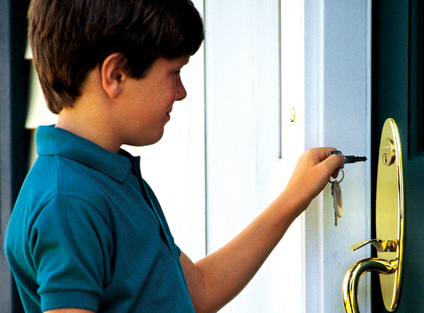The idea of allowing your children to stay home alone can cause you to be anxiety ridden, but there are considerations to make and suggestions to take to make the experience smooth for everyone involved. As you make your decision, remember that 12 is the rule of thumb age when most adults feel safe leaving a child alone. However, you are the parent, and you know your child better than anyone else. Think about your child’s judgment and maturity level. Does your child show signs of responsibility? Does your child think well under stress? Does your child listen to your rules when you are present?
Other factors to consider are the safety of your neighborhood, proximity of friends and family members, possession of family pets, and whether or not your oldest child will be responsible for caring for your younger children. If you are going to have an older child care for younger children, be sure that your oldest child has a successful track record of staying home alone, and that he or she has taken a first aid course, as well as a babysitting course. These classes are generally available at libraries, fire stations, and hospitals. Read on for some additional valuable insights.
Safety Measures
Do you have home security in Ohio or wherever your home is located? The mere existence of these systems can be enough to ward off prowlers. If you don’t have a system, consider getting one, and if you do, be sure that your child knows how to use it. Also be sure that your child knows how to correctly lock and unlock windows and doors. Make sure that they know what to do in case of fire or injury.
Conduct Progressive Time Alone Trials
Be sure that you gradually work up to a full day away from your child. You don’t want your first time away to be extended. Start with time frames as small as half an hour or one hour and work up to longer periods of time depending on your child’s willingness and comfort level. Consider whether it will be light or dark while your child is home alone. Even older children can be spooked when left alone after daylight.
Clearly Post Important Phone Numbers
Make a listing of your phone number, as well as other key people in your child’s life. Also list emergency numbers, such as 911 and poison control. Try to keep your cell phone on you at all times, even if it is set to vibrate. Be sure that important phone numbers are clearly posted.
Discuss Possible Scenarios
You may think that your child knows what to do in emergencies, but having a question and answer time can put you both at ease. Review the location of emergency items such as fire extinguishers, first aid kits, and flashlights, and then discuss scenarios such as fire alarm going off, power going off, smelling gas or smoke, someone knocking at the door, or someone choking.
Review Ground Rules
Talk about your expectations regarding friends. Can they come over while you are away? Can your child play with a friend outside? Also talk about what your child will eat. It is a great idea for your child to eat foods that do not require the use of the stove. Also talk about phone and internet usage, and be sure that filters are in place.
Preparing is essential. You will feel better when your child is better equipped with knowledge, and so will your child. Growing up and letting go is hard, but it is part of life, and can be made smoother by treating your child with love and being sure that you put your best efforts into each situation.
Earnest Parenting: help for parents who want to leave kids safely in charge.


